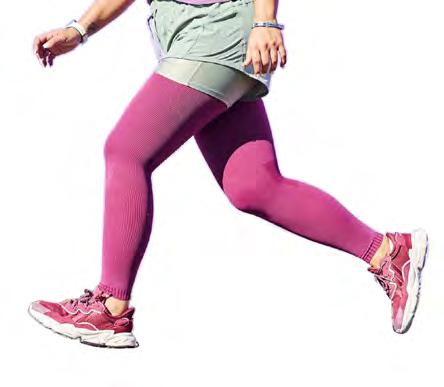




































ThisApril,aswecontinueoureffortstoraise awarenessandsupportthelymphedema community,Iwouldliketoexpressoursincere gratitudetoBauerfeind,ourPlatinumSponsor forthemonth.Don’tmisstheirwebinarfor healthcareprofessionalsonApril9atnoon—an excellentopportunitytoexpandyour knowledge.
Thisissueoffersinsightfularticlesonkeytopics. You’llfindafeatureexploringinflammationand itsbroaderimpactonhealth.Whileresearchon thedirectconnectionbetweendiet, inflammation,andlymphedemaremains limited,itiswidelyrecognizedthatreducing inflammationthroughawell-balanceddietcan enhanceoverallwell-being.
Additionally,WoundsCanadahasexpandedits guidelinesbyincludingadedicatedchapteron lymphedemaintheirlatestpublication.This resourceprovidesbestpracticesforpreventing andmanagingwoundsrelatedtolowerlimb lymphedema—avaluabletoolforboth healthcareprofessionalsandpatients.

WealsohighlightthefindingsofDr.MeiFu,whose researchexaminestheeverydayrisksthatcan increasethelikelihoodofdevelopinglymphedema afterbreastcancer.Proactiveskincareand heightenedvigilanceremainessentialinpreventing complications.
Finally,wetakeamomenttohonorMarie-Claude Gagnon,ourexecutivedirector,whopassedaway afteranabsenceof2yearsduetoillness.Hertime attheLAQleftasignificantmark.This commitmentiscarriedforwardwithdetermination byGinetteBardou,ourinterimexecutivedirector, whoensuressoundandcompassionateleadership. Marie-ThérèseLeNoircontinuestoprovidea warmwelcomeandinvaluablesupporttoour members.Aschairoftheboard,Iremainfocused onourstrategicdirectionandcommunications, offeringongoingsupporttoourdedicatedteam.
TheLAQstandsstrongandcommitted.Together, let’scontinueourmission.
Takecareofyourselvesandyourlovedones.
Anne-MarieJoncas PresidentoftheLAQ


Make a difference!
Are you a dynamic leader with a strategic vision? Would you like to put your management, development and advocacy talents to work for a vital cause?
The Lymphedema Association of Québec (LAQ) is looking for a General Manager to help raise its profile and defend the rights of lymphedema sufferers.
Reporting to the Board of Directors, you will play a key role in the organization’s operational management, partnership development and community mobilization. You will participate in administrative management and advocacy activities, while ensuring the growth and sustainability of the LAQ.
We are looking for a passionate manager with excellent leadership skills, strong networking abilities and expertise in organizational development. Experience in an associative or healthcare environment is an asset.
Apply before April 24, 2025 and join a committed team!






How many times have we been asked what kind of diet can be adopted to control chronic edema or lymphedema? It is essential to remember that although these diseases involve inflammation, this article does not aim to conclude that the anti-inflammatory diet has a direct effect on these conditions. Rather, the aim is to explore the role of inflammation in overall health.
Lymphedema, either primary or secondary to cancer, trauma, severe obesity, lipedema or chronic venous insufficiency, manifests itself as chronic swelling in one or more parts of the body. This swelling results from an abnormal accumulation of protein-rich fluid in the interstitial tissues, thus leading to inflammation. Although current research does not allow specific dietary recommendations for chronic edema or lymphedema to be made, many studies agree on the pro- and anti-inflammatory effects of certain foods. In 2020, a team of researchers demonstrated that inflammation precedes adipocyte differentiation and fat deposits in lymphedema, and that blocking it can limit this accumulation in animal models. These results highlight the importance of a better understanding of the inflammatory process.
L'info AQL has explored various content on inflammation and offers you a two-part summary. Keep in mind that there is no evidence to date that any particular diet can directly reduce or aggravate inflammation in chronic edema or lymphedema. However, more and more health professionals are recommending a diet rich in foods with anti-inflammatory properties to improve overall health.

Three out of five people worldwide die each year from an inflammation-related disease. This disease can be cancer, obesity, diabetes or heart disease, among others, and inflammation plays a role in all of these diseases: it is the “silent killer.” Diet is a key factor in increasing or reducing this inflammation. It is the greatest threat to human health, according to the World Health Organization (WHO), but despite its importance, it is largely unknown to the population. It is essential to distinguish between acute inflammation and chronic inflammation. In both cases, the immune system intervenes, but with very different consequences.
Although everything related to inflammation gets a bad press, in reality, inflammation is a natural and positive response of our body to protect and repair us in case of injuries or infections, such as when we cut our skin and the immune system intervenes to heal us, or when we catch the flu and the immune system mobilizes so that it doesn’t last more than a week. The problem arises when we are not talking about a one-off attack due to an injury or a virus, but when there is constant damage inside our body and the inflammation becomes chronic. So, contrary to popular belief, inflammation in itself is not bad, because although it produces unpleasant effects, it is a natural and healthy response of the body to a threat. Inflammation is the response of the immune system and one of its symptoms can be swelling.






This reaction of the immune system to an injury or infection generally disappears once the cause is resolved. It is a natural process that aims to protect the body and promote healing. For example, when faced with a foreign invader—such as a bacterium or a virus—our defences activate the necessary mechanisms to eliminate it. In fact, the suffix -itis that accompanies many conditions, from gastroenteritis to conjunctivitis, means “inflammation.” When we injure ourselves, the damaged area may become inflamed, warm, and red; these are signs that our immune system is repairing the damaged tissue. And as healing progress, the inflammation subsides.

Unlike acute inflammation, which is a rapid and temporary response to a specific injury or infection, low-grade inflammation is one that occurs as a defence mechanism, but lasts a long time. Although it is often less obvious in terms of visible physical symptoms, it can persist for weeks, months or even years. As Dr. Robert Shmerling, medical director of the Harvard publication “Combatting Inflammation,” points out, this response “becomes harmful when it is prolonged over time and begins to damage healthy cells.” This inflammatory process takes place in three phases:
• A combination of factors. These include an unhealthy diet, a sedentary lifestyle, chronic stress, lack of sleep, smoking and other environmental factors.
• The body reacts. When the immune system detects these triggers, it considers them a threat and releases proinflammatory chemicals, such as cytokines, which initiate and maintain the inflammatory process.
• A permanent state of alert. The body goes on alert and, over time, this can damage tissue and play a role in insulin resistance, endothelial dysfunction (regulates flow in the blood vessels), the formation of plaques in the arteries and the progression of neurodegenerative diseases.




This term, which combines “inflammation” and “aging”, refers to the chronic process of lowintensity inflammation that occurs during the aging process. With age, the immune system tends to lose its effectiveness and the body’s inflammatory response changes. This phenomenon can persist for long periods of time without any obvious external cause. Inflammation is thought to be caused by a combination of factors, including the accumulation of senescent cells, oxidative stress, mitochondrial dysfunction and changes in microbiome composition.





Although the symptoms are generally not noticeable, inflammation can increase the risk of certain types of diseases and disorders in specific parts of the body such as the heart, brain, joints and gastrointestinal tract. Although these parts do not swell, they are affected by an abnormal response of the immune system.

• Heart. Chronic inflammation can increase the risk of heart attacks and is thought to be linked to cholesterol. “As cholesterol invades the artery wall, the immune system treats it like any other invader and releases chemicals that produce inflammation to help eliminate it,” analyzes Robert H. Shmerling, MD, PhD, rheumatology, Harvard University (USA). A fibrous layer forms on the plaque. The inflammation can eventually attack this layer and, if it ruptures, cholesterol, inflammatory cells and chemicals spill into the artery, causing a blood clot to form and block blood flow.
• Brain. Chronic inflammation has been linked to neurodegenerative diseases such as Alzheimer’s disease, Parkinson’s disease and multiple sclerosis. Chronic inflammation is thought to contribute to nerve cell damage and cognitive decline in these diseases. Inflammation can also slow down cognitive functions, making it more difficult to concentrate, learn and remember.
• Joints. Chronic joint inflammation is a characteristic symptom of arthritis, which can manifest itself in various forms, such as rheumatoid arthritis, osteoarthritis and psoriatic arthritis. These inflammatory conditions can cause pain, stiffness, swelling and decreased mobility.
• Gastrointestinal tract. This type of inflammation is also linked to inflammatory bowel diseases, such as Crohn’s disease or ulcerative colitis, as well as celiac disease (an inflammatory reaction in the small intestine in response to gluten). It has also been associated with an increased risk of developing gastrointestinal cancer.
• Inflammation of the liver. Chronic inflammation can affect the liver and contribute to the development of liver diseases such as chronic hepatitis, non-alcoholic fatty liver disease (fatty liver) and cirrhosis. These conditions can cause progressive liver damage and liver dysfunction and trigger liver cancer.


Although there is no scientific evidence yet that an anti-inflammatory diet can directly improve the symptoms of chronic edema/lymphedema, adopting a balanced diet rich in anti-inflammatory foods is beneficial for overall health. A proactive approach, including regular physical activity, stress management and restful sleep, can also help reduce chronic inflammation.


Cytokines are small proteins responsible for inflammation regulation. They act as messengers for our immune system, so that if the immune system goes out of control, inflammation ensues.



Diet, a sedentary lifestyle, chronic stress, lack of sleep and smoking trigger acute inflammation.

References:

Stay tuned for the second part of this article, which will appear in the May issue of L’info AQL. We will explore in more detail the specific impact of diet on inflammation and share practical tips for integrating beneficial food choices into your daily life.
Inflammation, adipogenèse et lymphangiogenèse : modèle expérimental de lymphœdème M. Andrade, G. Cuadrado, S. Ariga, T. Lima, A. Jacomo, H. Souza, Journal de médecine vasculaire, Volume 45, mars 2020 https://www.sciencedirect.com/science/article/pii/S254245132030105X
L’inflammation chronique, ennemie silencieuse de l’organisme (28 août 2024)
Nadège Lucas, National Geographic https://www.nationalgeographic.fr/sciences/inflammation-chronique-ennemie-silencieuse-de-organisme-pathologies-inflammatoireschroniques-sante-medecine#:~:text=Selon%20l’Organisation%20Mondiale%20de,de%20vie%2C%20peuvent%20avoir%20des
Why all the buzz about inflammation—and just how bad is it? (December 18, 2024)
By Robert H. Shmerling, MD, Senior Faculty Editor, Harvard Health Publishing; Editorial Advisory Board Member, Harvard Health Publishing https://www.health.harvard.edu/blog/why-all-the-buzz-about-inflammation-and-just-how-bad-is-it-202203162705
An action plan to fight unhealthy inflammation (December 4, 2024)
By Robert H. Shmerling, MD, Senior Faculty Editor, Harvard Health Publishing; Editorial Advisory Board Member, Harvard Health Publishing https://www.health.harvard.edu/blog/an-action-plan-to-fight-unhealthy-inflammation-202205052739






Lymphedema Awareness Month was filled with impactful events and significant victories for our community. One of the standout moments was the announcement of crucial support: thanks to the Fondation des Cèdres and the MUHC Foundation, the Lymphedema Clinic has secured essential funding for the next three years. This news brings a renewed sense of hope for patients and highlights the incredible strength of collective action.




The LAQ has successfully amplified the conversation around lymphedema in the media. Our recent appearance on the TVRM television network brought greater awareness of the realities of chronic edema to a wide audience. If you haven’t had a chance to watch it yet, you can catch the interview here:
Watch the interview (starting at 22 min).

At the same time, we had the privilege of collaborating with Dr. Èvelyne Bourdua-Roy and neuroscientist Sophie Rolland for two insightful episodes of the Santé vous mieux podcast. These engaging discussions cover essential topics related to lymphedema and chronic edema, providing valuable information for listeners.
For the best experience, please use Edge or Firefox (not compatible with Chrome).
We extend our heartfelt encouragement to all those who face the challenges of chronic edema or lymphedema with courage and determination.




Over 250 participants joined our exclusive webinar titled Overweight, Lymphedema, and Lipedema: Better Understanding for Better Action. Held as part of Lymphedema Awareness Month, this conference shed light on the complex connections between these conditions.
A heartfelt thank you to Dr. Anna Towers, a leading expert in lymphedema in Quebec and across Canada, for sharing her invaluable knowledge and passion with our community. The insightful discussions and thought-provoking questions from participants made this event a tremendous success.
Stay tuned for more educational initiatives from the LAQ!

Following the recent announcements about the Lymphedema Clinic and the success of Lymphedema Awareness Month, we have been deeply touched by an outpouring of messages of support. Here’s a glimpse of this wave of gratitude:

“What wonderful news for the Lymphedema Clinic! I have already benefited from its services, and Dr. Anna Towers and her entire team are simply extraordinary. A big thank you to the Fondation des Cèdres and the MUHC Foundation for their support. I would also like to express my appreciation to all those who initiated and signed the petition.”
—Mado Desforges, CROIRE Development and Coordination Manager

“I would like to take this opportunity to thank you for the incredible work your association does for people living with lymphedema.”
—Evelyne Grenier-Ouimette, Deputy Chief Executive Officer, CISSS de l’AbitibiTémiscamingue

“Bravo! Excellent interview.”
—Dr. Nicole Paquette, following our television appearance

“Well done to you all!”
—Chantal Mimeault, person with lymphedema and LAQ member

“Anne-Marie, I’m really glad to see that you are spreading awareness about lymphedema. Great job!”
—Diane Martin, living with lymphedema, Alberta Lymphedema Association
These heartfelt testimonials further strengthen our commitment and remind us of the importance of every action taken by the LAQ. Thank you for your support and continued mobilization. Together, let’s keep advancing the cause of lymphedema!
Understanding compression with Véronique Bordeleau
Wednesday, April 9, 2024 | 12 p.m. (noon) | ZOOM (in French)
OPTIMIZE YOUR EXPERTISE IN MEDICAL COMPRESSION !

This exclusive webinar, presented by Véronique Bordeleau, a nurse specializing in phlebology and manager at Bauerfeind, will give you a better understanding of the role of compression in the management of chronic edema. With special collaboration of Marie-Eve Letellier, PhD, Rehabilitation, CLT
On the program:
• The key principles of medical compression
•Indications and contraindications
•How to choose and adjust compression garments correctly
Free event—MANDATORY registration
Bauerfeind is proud to be a Platinum sponsor of the LAQ.
Wednesday, April 16 at 7 p.m. ZOOM (in French)

Better understanding your body means better management of your lymphedema! Self-assessment is an essential skill for monitoring the progression of lymphedema, adjusting treatments and preventing complications. By learning to recognize changes in your condition, you become the actor of your own well-being.
With Maude Jubinville, certified lymphedema therapist, discover:
•How to monitor the progression of your lymphedema (volume, skin, sensations)
•The signs to look out for to prevent complications
•Good practices for adapting your care and communicating better with your medical team
Free event—MANDATORY registration
The new LANA consensus for lymphedema
with Marie-Eve Letellier, certified lymphedema therapist
Wednesday, May 7 | 12 p.m. (noon) | ZOOM (in French)

Healthcare professionals are warmly invited to attend a presentation on the new LANA Consensus, recently published in Medical Oncology, presented by Marie-Eve Letellier, PhD in Rehabilitation, KIN, KT, ORT, ALT, CDT (V), and therapist at the Supraregional Lymphedema Center at the MUHC. This session will provide insights into key updates, including:
• Revised risk reduction practices
• Identification of non-cancer-related predictive factors
• Essential components of the decongestion and maintenance phases of CDT
• Recommendations for patients considering lymphatic surgery
• Pre- and post-operative management for those undergoing lymphedema surgery
While the Q&A session will be exclusively for healthcare professionals, individuals at risk for or living with lymphedema are welcome to attend as listeners.
Free Event—Registration REQUIRED
We look forward to seeing you!
This lymphedema event is made possible by the dedication of volunteer therapists and the Lymphedema Association of Québec. The LAQ’s mission is to support people at risk and those affected by lymphedema, while raising awareness of lymphedema as a chronic disease among health professionals.


Managing chronic edema, whether of lymphatic origin (lymphedema), venous (chronic venous insufficiency—CVI), or caused by lipedema, is a significant challenge for many individuals. Aqualymphatic therapy (ALT) is emerging as a highly beneficial complementary approach for these patients. This training, supported by the Lymphedema Association of Québec (LAQ), is in preparation to train certified therapists in the application of this promising method.


ALT was developed by Dorit Tidhar, an Israeli physiotherapist and lymphotherapist, based on research into the effects of water immersion on lymphatic circulation. This method involves gentle exercises performed in water at a controlled temperature. In addition to aquatic movements that promote lymphatic circulation, deep breathing plays a key role in optimizing results. Combined with the movements, breathing enhances lymphatic drainage and reduces discomfort, particularly for those with lymphedema, lipedema, or CVI.


One of the primary benefits of ALT is the natural compression provided by water. Immersion generates hydrostatic pressure that increases with depth, acting as beneficial compression. This process supports natural drainage while offering increased comfort due to the buoyancy of the body in the water.
Certified therapists in the treatment of chronic edema/lymphedema will gain significant value from this training, whether to teach ALT to their patients or to deepen their understanding of this method. ALT is effective for treating edema of various origins, not just lymphedema. Individuals with lipedema or chronic venous insufficiency (CVI) can also benefit from ALT, allowing therapists to expand the range of treatments they offer. This training will also provide a better understanding of the pathophysiological mechanisms behind different types of chronic edema and enable therapists to adapt their treatment strategies to the specific needs of each patient.

The Tidhar method, developed by Dorit Tidhar, stems from her training in lymph therapy with Professor Judith Casley-Smith. She created a program of aquatic exercises aimed at improving lymphatic circulation and alleviating chronic edema symptoms. Her research, including a randomized controlled trial, has validated the effectiveness of this method, which is now recognized globally.


Details regarding the trainer, dates, and costs for the training are still being finalized. However, certified therapists interested in ALT can already register their interest by sending an email titled “Aqualymphatic Training for Therapists” to aql@infolympho.ca.
Stay tuned for more details and don’t miss this unique opportunity to expand your expertise and offer lasting relief to your patients with chronic edema.





It is with great sadness that we pay tribute to Marie-Claude Gagnon, Executive Director of the Lymphedema Association of Québec (LAQ), who passed away on March 17, 2025, at the age of 59. Her career with our organization stands as a testament to her exceptional dedication and unwavering commitment.
Marie-Claude joined the LAQ as a volunteer in 2018 and quickly stood out for her dedication and collaborative spirit. She served as Deputy Director from 2019 to 2022 before assuming the role of Executive Director in April 2022. In addition to her significant contributions, she generously contributed to the organization’s governance as Vice-President and Treasurer of the Board of Directors.
Her impact was felt across every aspect of the LAQ. Whether in administrative duties, member support, or advancing the Council’s initiatives, she consistently demonstrated remarkable dedication and accessibility. Her efforts in organizing educational and support groups, as well as managing the helpline, provided essential guidance to many individuals living with lymphedema.
During the challenges of the 2020 pandemic, Marie-Claude displayed extraordinary resilience and determination. In the years that followed, she remained a driving force for the LAQ, passionately advancing the cause of lymphedema.

We will remember Marie-Claude for her kindness, generosity, and unwavering positivity. Her passion and conviction left a lasting impression on all who had the privilege of working with her.
In her memory, we invite you to donate to the Québec Breast Cancer Foundation. Our thoughts are with her family and loved ones during this difficult time.
The team of the Lymphedema Association of Québec

The family of Mrs. Marie-Claude Gagnon will receive condolences on Sunday, April 6, 2025, from 1 to 3 p.m., at the Mausolée Lalime, 1325 Girouard Street East, Saint-Hyacinthe.
•Digital magazine L’info AQL
•Printed quarterly Pathways magazine
•Self-management booklet Learning to take charge
•Cellulitis Assistance Card
•Self-measurement guidelines for arms and legs
•L’info AQL Surgery edition
•VIP invitations for support education and groups, plus events
•Your tools are mailed to you AND accessible in your online Member Section
A Members’ Area containing all your tools, plus all RAMQ program documents, including the Request for Review form
The annual dues for Regular Members are $42.


Cumulative as of March 31,2025 (end

It is common to confuse edema, lymphedema, and lipedema, but these three conditions are distinctly different. Let’s explore their particularities together.
What is Edema?
Edema is an abnormal accumulation of aqueous fluid in the tissues, often caused by underlying medical conditions, such as:
• Hypertension
• Varicose veins
• Thrombophlebitis
• Congestive heart failure
• Renal failure
• Steroid therapy
• Inflammatory reactions
• Injuries or trauma


Diuretics are commonly used to reduce the water retention associated with edema, as excess fluid primarily consists of water. Edema is considered chronic when it persists for more than three months.





Lymphedema, on the other hand, is an abnormal accumulation of lymphatic fluid in the tissues. It can be:
Primary: Due to a congenital or hereditary malformation of the lymphatic system.
Secondary: Resulting from the removal of lymph nodes, damage caused by radiation therapy, injury, trauma, obesity, poor venous return, or parasitic infection.
Unlike edema, diuretics are ineffective in treating lymphedema because the fluid accumulation consists of lymph, not water.
Lipedema is an abnormal and disproportionate accumulation of body fat, primarily affecting the legs, thighs, hips, and sometimes the arms. This condition can put excessive pressure on the lymphatic system, risking damage to its functions. As a result, lymph may leak from the lymphatic vessels, leading to secondary lymphedema.
Lipedema is often painful and can cause spontaneous bruising. An accurate diagnosis is essential to distinguish this condition from lymphedema or obesity.
Recognizing diseases caused by chronic edema, including edema, lymphedema, and lipedema, is essential for accurate diagnosis and effective management. Increased awareness not only reduces diagnostic delays but also improves access to specialized treatment and care. Thanks to advancements in research and global health initiatives, these conditions are now receiving greater attention, providing patients with better support and an enhanced quality of life.

Here are some tips to guide your conversation:
✔ Discuss your specific needs and target areas.
✔ Ask for recommendations on fabric types and appropriate compression levels.
✔ Inquire about the possibility of custom adjustments (wider bands, padding) for improved comfort and effectiveness.
Please note: products from major manufacturers available on Amazon are not custom-made and may not meet your specific requirements.
To learn more about compression

Living with chronic edema, whether it’s lymphedema or lipedema, requires taking care of your body while also prioritizing your well-being. Compression garments play a crucial role in managing edema, helping to reduce fluid buildup and promoting improved circulation. Why not combine performance with style? Choosing attractive, well-fitting garments can also enhance your mood. Before making your selection, it’s important to consult with an orthotist, fitter, or therapist to explore the options that best suit your needs.
